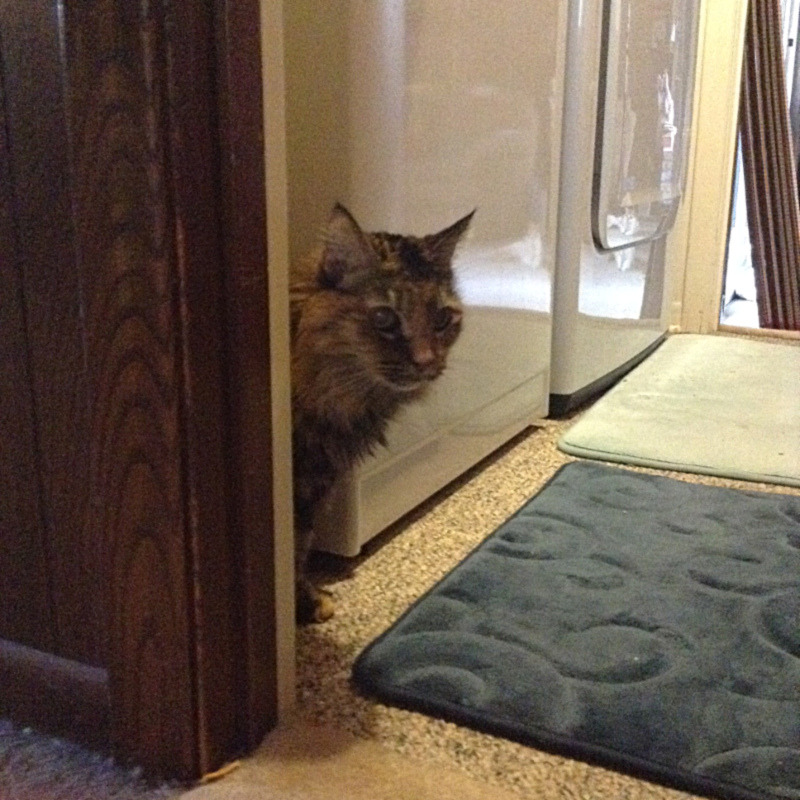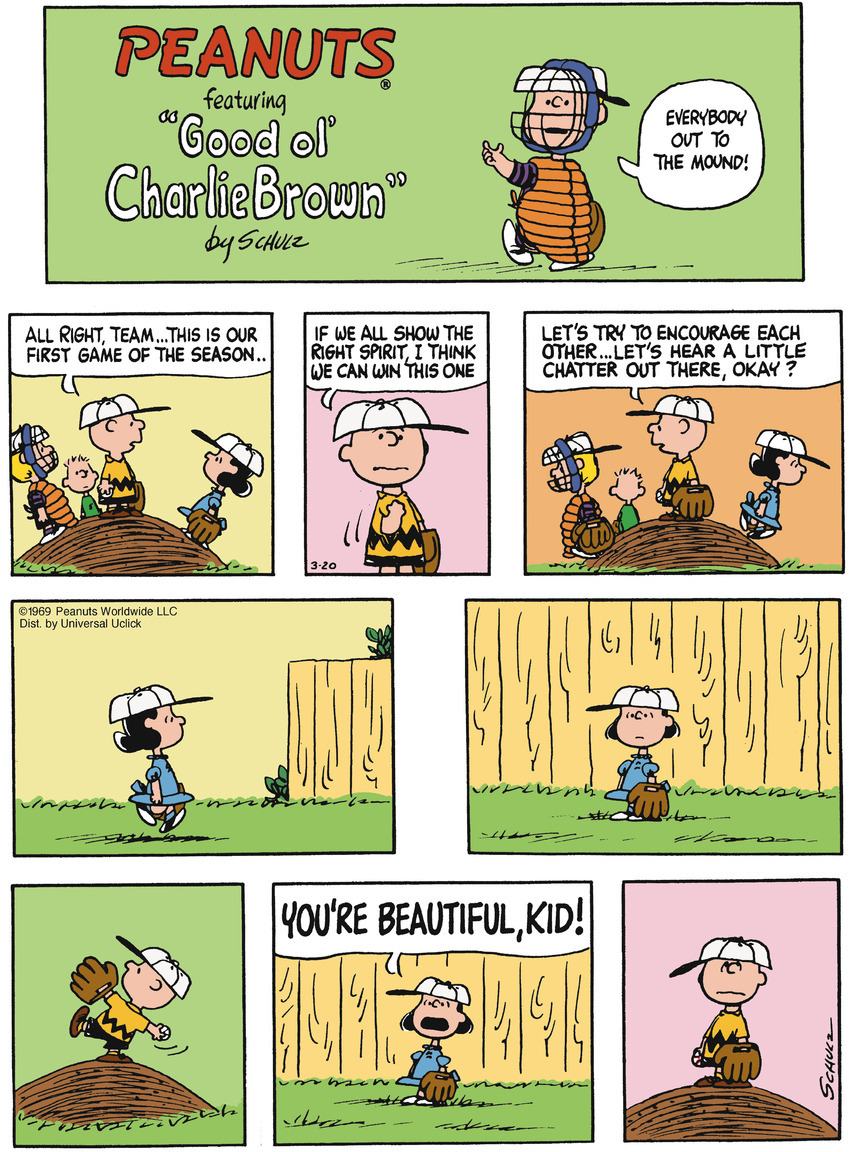"The Buddha spoke gently, “Once a person is caught by belief in a doctrine, he loses all his freedom. When one becomes dogmatic, he believes his doctrine is the only truth and that all other doctrines are heresy. Disputes and conflicts all arise from narrow views. They can extend endlessly, wasting precious time and sometimes even leading to war. Attachment to views is the greatest impediment to the spiritual path. Bound to narrow views, one becomes so entangled that it is no longer possible to let the door of truth open." ~Thich Nhat Hanh, in Old Path White Clouds: Walking in the Footsteps of the Buddha (via)
Thursday, March 31, 2016
Campaign 2016
Tuesday, March 29, 2016
Your love got me…
I'm probably going to have to listen to all of Anohni (previously Antony Hegarty)'s albums now. I'm kind of on a tear.
(Also: I have no idea if I put the apostrophe-s in the right place in that earlier sentence. Please don't be angry with me.)
Monday, March 28, 2016
But I can't go home this a'way…
Saturday, March 26, 2016
Curiouser
"Two words, from Pema Chödrön: 'Be Curious.' Rather than being judgemental, fearful, angry, hurt, annoyed, or even complimented, just be curious. Those two words have brought me more peace than pretty much anything." ~Jo Virgil, Austin, Texas
Friday, March 25, 2016
Faith
Chris was caught in a transition in Catholicism between an old-church approach to faith and a newer way of thinking. The old view of spirituality was that life was like climbing a mountain. You have to fight onward and upward, climbing with your spiritual crampons until you reach the top – and that's perfection. You pass the trial and you pass the test and you get so many gold stars in your copybook. Then you come before the heavenly throne for judgment, and maybe you got a couple of indulgences in your back pocket in case your accounting was wrong.
But that kind of faith only gets a person so far. Your spiritual life isn't like climbing a mountain, waiting to find God at the top. It's a journey, full of highs and lows, and God is there with you every step of the way, in the here and now and in the hereafter.The first approach is really a whole lot of smoke and mirrors. It's only the second one that allows a person to grow, but that second view is hard for people to get a hold of unless they get in touch with themselves.
Chris didn't feel that he was worthy of God's love. He felt he had to prove himself. Well, you're never going to get very far in any relationship with that kind of belief. Imagine if you had to prove yourself to your spouse every single day; that's not the way love works. In all of our talks, that was the one thing I really tried to work with him on, adjusting to this different idea of faith, but he never really moved from one to the other. It's hard. It takes a long time to come around to that way of thinking, and Chris just ran out of time.
You and Yours
"The thing that was great about Chris was that he started all of his conversations with 'How was your day? What did you do?' Nobody does that anymore. That's why Chris was so different from most people. He was not selfish at all when it came to being a friend."
Thursday, March 24, 2016
I'll just look it up.
It's a much more engaging topic than you'd think at first glance. Here's an excerpt:
The "English dictionary," in the sense that we commonly used the phrase today – as an alphabetically arranged list of English words, together with an explanation of their meanings – is a relatively new invention. Four hundred years ago there was no such convenience available on any English bookshelf.
There was none available, for instance, when William Shakespeare was writing his plays. Whenever he came to use an unusual word, or to set a word in what seemed and unusual context – and his plays are extraordinarily rich with examples – he had almost no way of checking the propriety of what he was about to do. He was not able to reach into his bookshelves and select anyone volume to help. He would not be able to find any book that might tell him if the word he has chosen was properly spelled, whether he had selected it correctly, or had used it in the right way in the proper place.
Shakespeare was not even able to perform a function that we consider today as perfectly normal and ordinary a function as reading itself. He could not, as the saying goes, "look something up." Indeed the very phrase – when it is used in the sense of "searching for something in a dictionary or encyclopedia or other book of reference "– simply did not exist. It does not appear in the English language, in fact, until isolated 1692, when an Oxford historian named Anthony Wood used it.
"Of course we did."
“You want to know what this was really all about? The Nixon campaign in 1968, and the Nixon White House after that, had two enemies: the antiwar left and black people. You understand what I’m saying? We knew we couldn’t make it illegal to be either against the war or black, but by getting the public to associate the hippies with marijuana and blacks with heroin, and then criminalizing both heavily, we could disrupt those communities. We could arrest their leaders, raid their homes, break up their meetings, and vilify them night after night on the evening news. Did we know we were lying about the drugs? Of course we did.”
That's one of the most evil things I think I've ever heard.
Tuesday, March 22, 2016
Use At Your Own Risk
- last: ultimate
- second to last: penultimate
- third to last: antepenultimate (also propenultimate)
- fourth to last: preantepenultimate
- fifth to last: propreantepenultimate
Monday, March 21, 2016
So Many Roads
Life's Been Good To Me, So Far…
"Yes, politics is a mess because liberals are uncertain and conservatives want it to be 1958, but our happiness never depended on politicians. Not ever. If the lights come on and the toilet flushes and the grocery store is open, then we're basically okay. The rest is gravy. Complaining is fun, a whole art form, but don't get carried away. Life is good." ~Garrison Keillor, from "Life is Good," Men's Health April 2016
Sprouts


This is a BioSet Germinator, and I’ve used one to grow my own sprouts for years. There are a lot of choices beyond just the alfalfa sprouts you find in the grocery store, and it’s a lot of fun to watch them sprout and grow.
I bought mine from Johnny’s Seeds, a family-owned business I’ve always had good experiences with.
Sunday, March 20, 2016
I have no idea.
I'm especially fond of the line, "Whoever brought me here will have to take me home." It sounds like a line Robert Hunter would write, and the Grateful Dead would interpret.
Who Speaks With My Mouth?
by Jalal ad-Din Muhammad Rumi
translated by Coleman Barks
All day I think about it, then at night I say it.
Where did I come from, and what am I supposed to be doing?
I have no idea.
My soul is from elsewhere, I'm sure of that,
and I intend to end up there.
This drunkenness began in some other tavern.
When I get back around to that place,
I'll be completely sober. Meanwhile,
I'm like a bird from another continent, sitting in this aviary.
The day is coming when I fly off,
but who is it now in my ear who hears my voice?
Who says words with my mouth?
Who looks out with my eyes? What is the soul?
I cannot stop asking.
If I could taste one sip of an answer,
I could break out of this prison for drunks.
I didn't come here of my own accord, and I can't leave that way.
Whoever brought me here will have to take me home.
This poetry, I never know what I'm going to say.
I don't plan it.
When I'm outside the saying of it,
I get very quiet and rarely speak at all.
(It may help to know that in Rumi's time and place, drunkenness was often used as a metaphor for spiritual ecstasy.)
Saturday, March 19, 2016
Crime and Punishment
In the Western world we put them in iron cages and keep them suspended in a state of fear, boredom, depression, and frustration, often for years at a time. This is considered "civilized."
Why is mental torment considered superior to physical torment?
Friday, March 18, 2016
A crack that lets in the light
(It should start at the 3:00 mark. If not, jump ahead. :D )
I, Robot
“They’re always polite, they always upsell, they never take a vacation, they never show up late, there’s never a slip-and-fall, or an age, sex, or race discrimination case.”
There is another way to avoid slip-and-fall, age, sex and racial discrimination lawsuits that apparently hasn’t occurred to him yet: provide a safe environment, and don’t discriminate on the basis of age, sex, or race.
But yeah, good luck with your Robot Work Force, Andy. That’s not insane at all.
Thursday, March 17, 2016
Wednesday, March 16, 2016
"There's a crack in the gutter where a flower grows…"


We planted flowers like this one in around our mail box last year, and this year they’re growing out of cracks in the pavement along the road.
Which reminded me of this Michael Franti song: LINK
Sunday, March 13, 2016
Stem
I learned that mother and child exchange stem cells across the placenta, and these stem cells remain alive within their new bodies.
That means that, for as long as your mother lives, you will literally be a part of her; and for as long as you live, a part of your mother will always be alive in you.
Friday, March 11, 2016
Moot
"There has to be some concession to the need to be able to get into that information somehow… It’s fetishizing our phones above every other value and that can’t be the right answer. I suspect the answer is going to come down to how do we create a system that the encryption is as strong as possible, the key is as secure as possible, it is accessible by the smallest number of people possible for a subset of issues that we agree are important."
That's not going to work.
Once that box is opened, every president is going to find a way to pry it open just a little bit wider. What do you think Dick Cheney would have done with that privilege? Or Richard Nixon? How protective of our privacy do you think President "Bring back waterboarding!" Trump would be, and do you honestly think President Hillary would be any different? She'd be more discreet, certainly, but I have no doubts that she'd be rooting around in our data just as enthusiastically.
It's either open or it's closed; there is no in-between.
Of course, the point is probably already moot. Have you noticed the NSA has never once said, "Yes, we need a little help cracking phone encryption, too?"
This could well be just about finding legal cover for what they're already doing.
Mrs. R
She didn’t mean to be cruel. She had grown up in world where food was always available; if one thing wasn’t available, substitute another. She didn’t understand.
And I think that was Nancy Reagan’s problem. When she famously suggested “Just Say No,” the words were coming from a sheltered, protected, timid little bird-in-a-gilded-cage, one who knew nothing of the world outside. She had no idea what poverty and addiction were like. From her vantage, those were problems easily solved.
The difference between the two women is that Nancy had an opportunity to venture outside her cage, and never took advantage of it. A better husband, had she had one, would have helped her to see the world beyond her own privileged existence.
It’s both shameful and a shame that the idea never occurred to either of them.
If I knew the way…
In a world of pain and uncertainty, the Grateful Dead are a consistent source of comfort to me.
This mix has the crowd noise toned down, which is kind of a mixed blessing. I like hearing the voices more clearly, but I miss hearing the cheers when Jerry sings their favorite lines. Compare it to this older version: LINK
Thursday, March 10, 2016
Home

This is our cat Amanda (18 years old), sitting in one of her favorite spots: next to the washing machine.
When I chant my rounds, she likes to jump up and and rest in my lap.
It could be that she just likes the sound, or maybe the low chanting sounds like a purr, but I like to think that she was a Vaisnava Hindu in a previous life, and that to her it sounds like home.
Sunday, March 6, 2016
My Marigolds are Sprouting!

"All that is very well," answered Candide, "but let us cultivate our garden." ~Candide by Voltaire, available from Project Gutenberg.
Friday, March 4, 2016
"I felt a beast."
In his journal, he describes scenes far more gruesome and terrible than the one below- but I bet this was the one that haunted him for a long time to come:
Poor chap in 4th E. Lancs lost brother. Came broken hearted to ask me to bury him. On Saturday I asked the boy to identify the corpse being dragged down the trench on an oil sheet. He did not reply. I asked a second time sharply. "My brother," he managed to sob out. I felt a beast.
Carpe Frazz

In the 60s “Live for Today” became the slogan because at any moment the government could snatch you from your home, shave your head, stick a rifle in your hand, and send you half a world away-- perhaps never to return.
Today “Carpe Diem” is the slogan because the health care industry will eventually bleed you dry. They’re gonna get you, and there’s no escape. There's no point in saving something for a rainy day, because if it rains they're gonna take it.
So, sha la la-la-la, live for today.
Frazz is on the web HERE.
Robotman and Krishnamurti

Seeking a spiritual life in a materialistic society is weird.
I’m often reminded of this thought from Krishnamurti: “It is no measure of health to be well adjusted to a profoundly sick society.”
Monty and Robotman is on the web HERE.
Thursday, March 3, 2016
Wednesday, March 2, 2016
Bernie
As soon as Obama was elected, “Hope! Dream!” changed to “Well, this will never pass, so there’s no sense in even talking about it, much less bring it up for a vote.”
Maybe Bernie actually intends to act on his hopes and dreams- but once bitten, twice shy.
Tuesday, March 1, 2016
So…
"Sometimes people let the same problem make them miserable for years when they could just say, "So what." That's one of my favorite things to say. "So what." "My mother didn't love me." So what. "My husband won't ball me." So what. "I'm a success but I'm still alone." So what. I don't know how I made it through all the years before I learned how to do that trick. It took a long time for me to learn it, but once you do, you never forget." ~Andy Warhol, in The Philosophy of Andy Warhol: (From A to B and Back Again) ©1975
Streaming my consciousness, "So what?" was also the name of a Joe Walsh album, which reminded me of the song "Shut up!" You could sing that song substituting the words "So what!" if you wanted to.
